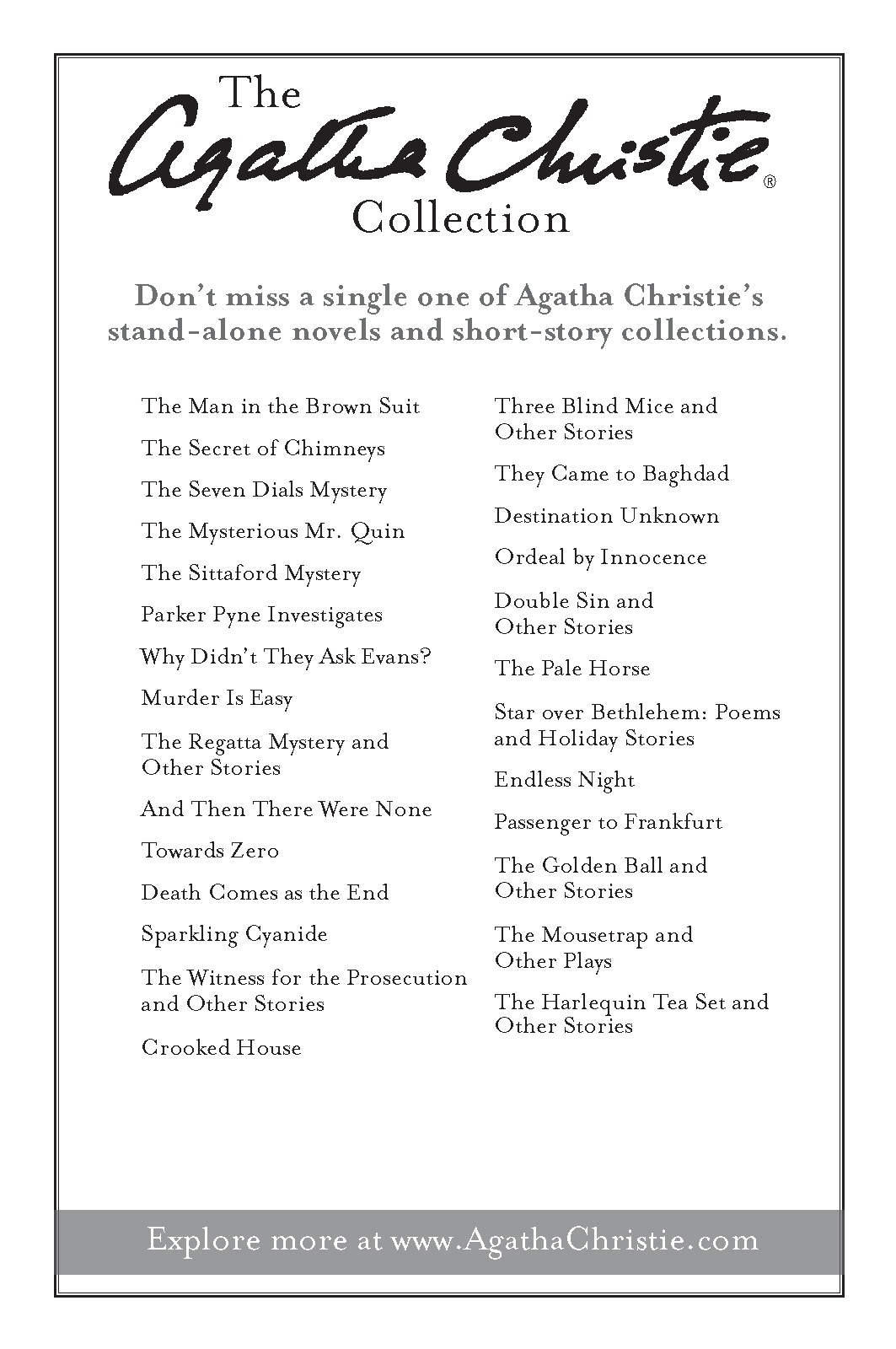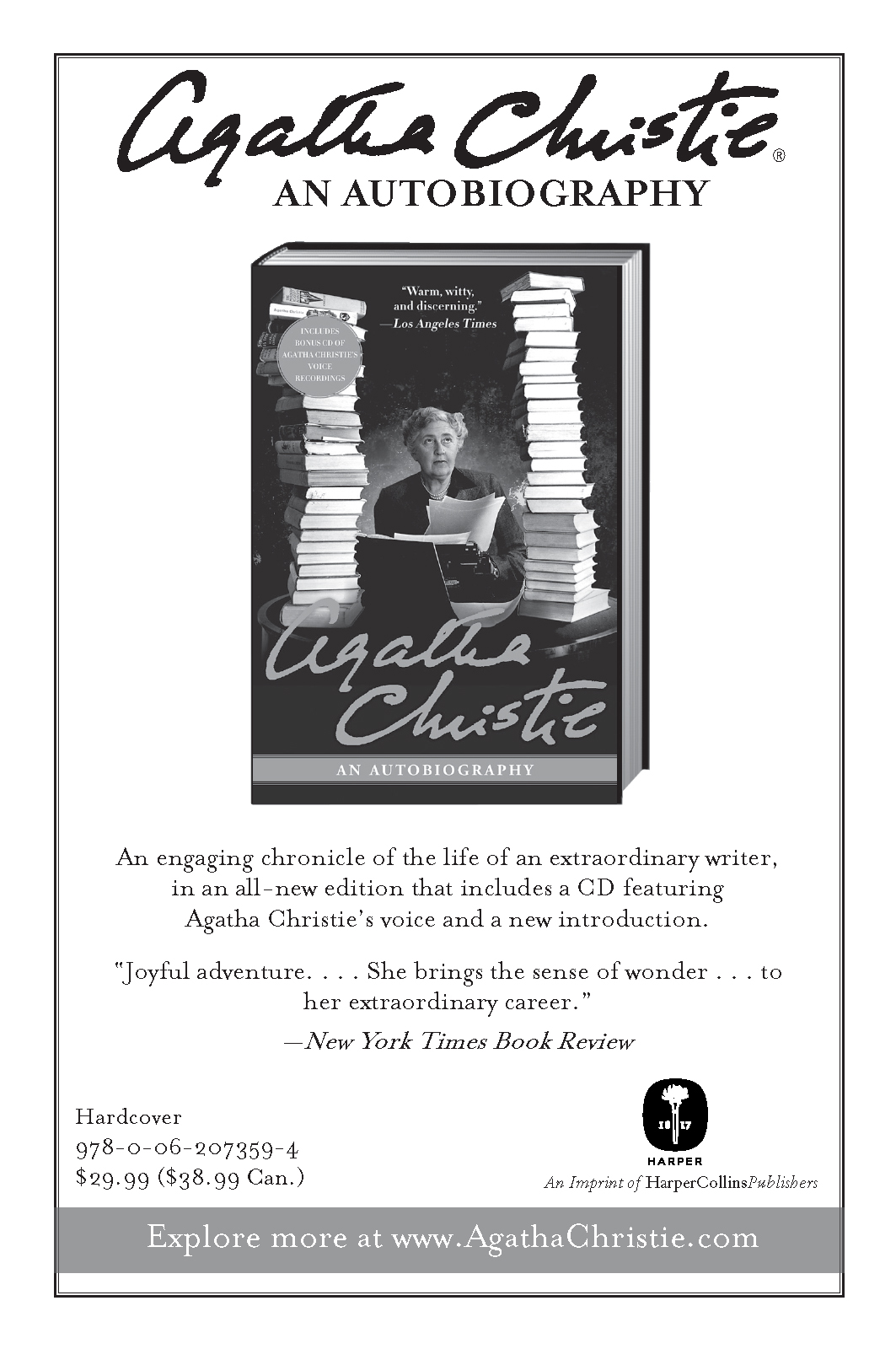Agatha Christie (3 page)
Authors: The Love Detectives (SS)

âThe valet,' cried Mr Satterthwaite. âThat girl just now â I wasn't paying any attention at the time.' He paused, striving for coherence. âShe was afraid of our suspecting him. There must be some motive that he had and which we don't know, but she does.'
Colonel Melrose frowned, then he rang the bell. When it was answered, he said, âPlease ask Lady Dwighton if she will be good enough to come down again.'
They waited in silence until she came. At sight of Delangua she started and stretched out a hand to save herself from falling. Colonel Melrose came quickly to the rescue.
âIt's quite all right, Lady Dwighton. Please don't be alarmed.'
âI don't understand. What is Mr Delangua doing here?'
Delangua came over to her, âLaura â Laura â why did you do it?'
âDo it?'
âI know. It was for me â because you thought that â After all, it was natural, I suppose. But, oh! You angel!'
Colonel Melrose cleared his throat. He was a man who disliked emotion and had a horror of anything approaching a âscene'.
âIf you'll allow me to say so, Lady Dwighton, both you and Mr Delangua have had a lucky escape. He had just arrived in his turn to “confess” to the murder â oh, it's quite all right, he didn't do it! But what we want to know is the truth. No more shillyshallying. The butler says you went into the library at half past six â is that so?'
Laura looked at Delangua. He nodded.
âThe truth, Laura,' he said. âThat is what we want now.'
She breathed a deep sigh. âI will tell you.'
She sank down on a chair that Mr Satterthwaite had hurriedly pushed forward.
âI did come down. I opened the library door and I saw â'
She stopped and swallowed. Mr Satterthwaite leaned forward and patted her hand encouragingly.
âYes,' he said. âYes. You saw?'
âMy husband was lying across the writing table. I saw his head â the blood â oh!'
She put her hands to her face. The chief constable leaned forward.
âExcuse me, Lady Dwighton. You thought Mr Delangua had shot him?'
She nodded. âForgive me, Paul,' she pleaded. âBut you said â you said â'
âThat I'd shoot him like a dog,' said Delangua grimly. âI remember. That was the day I discovered he'd been ill-treating you.'
The chief constable kept sternly to the matter in hand.
âThen I am to understand, Lady Dwighton, that you went upstairs again and â er â said nothing. We needn't go into your reason. You didn't touch the body or go near the writing table?'
She shuddered.
âNo, no. I ran straight out of the room.'
âI see, I see. And what time was this exactly? Do you know?'
âIt was just half past six when I got back to my bedroom.'
âThen at â say five-and-twenty past six, Sir James was already dead.' The chief constable looked at the others. âThat clock â it was faked, eh? We suspected that all along. Nothing easier than to move the hands to whatever time you wished, but they made a mistake to lay it down on its side like that. Well, that seems to narrow it down to the butler or the valet, and I can't believe it's the butler. Tell me, Lady Dwighton, did this man Jennings have any grudge against your husband?'
Laura lifted her face from her hands. âNot exactly a grudge, but â well, James told me only this morning that he'd dismissed him. He'd found him pilfering.'
âAh! Now we're getting at it. Jennings would have been dismissed without a character. A serious matter for him.'
âYou said something about a clock,' said Laura Dwighton. âThere's just a chance â if you want to fix the time â James would have been sure to have his little golf watch on him. Mightn't that have been smashed, too, when he fell forward?'
âIt's an idea,' said the colonel slowly. âBut I'm afraid â Curtis!'
The inspector nodded in quick comprehension and left the room. He returned a minute later. On the palm of his hand was a silver watch marked like a golf ball, the kind that are sold for golfers to carry loose in a pocket with balls.
âHere it is, sir,' he said, âbut I doubt if it will be any good. They're tough, these watches.'
The colonel took it from him and held it to his ear.
âIt seems to have stopped, anyway,' he observed.
He pressed with his thumb, and the lid of the watch flew open. Inside the glass was cracked across.
âAh!' he said exultantly.
The hand pointed to exactly a quarter past six.
âA very good glass of port, Colonel Melrose,' said Mr Quin.
It was half past nine, and the three men had just finished a belated dinner at Colonel Melrose's house. Mr Satterthwaite was particularly jubilant.
âI was quite right,' he chuckled. âYou can't deny it, Mr Quin. You turned up tonight to save two absurd young people who were both bent on putting their heads into a noose.'
âDid I?' said Mr Quin. âSurely not. I did nothing at all.'
âAs it turned out, it was not necessary,' agreed Mr Satterthwaite. âBut it might have been. It was touch and go, you know. I shall never forget the moment when Lady Dwighton said, “I killed him.” I've never seen anything on the stage half as dramatic.'
âI'm inclined to agree with you,' said Mr Quin.
âWouldn't have believed such a thing could happen outside a novel,' declared the colonel, for perhaps the twentieth time that night.
âDoes it?' asked Mr Quin.
The colonel stared at him, âDamn it, it happened tonight.'
âMind you,' interposed Mr Satterthwaite, leaning back and sipping his port, âLady Dwighton was magnificent, quite magnificent, but she made one mistake. She shouldn't have leaped to the conclusion that her husband had been shot. In the same way Delangua was a fool to assume that he had been stabbed just because the dagger happened to be lying on the table in front of us. It was a mere coincidence that Lady Dwighton should have brought it down with her.'
âWas it?' asked Mr Quin.
âNow if they'd only confined themselves to saying that they'd killed Sir James, without particularizing how â' went on Mr Satterthwaite â âwhat would have been the result?'
âThey might have been believed,' said Mr Quin with an odd smile.
âThe whole thing was exactly like a novel,' said the colonel.
âThat's where they got the idea from, I daresay,' said Mr Quin.
âPossibly,' agreed Mr Satterthwaite. âThings one has read do come back to one in the oddest way.' He looked across at Mr Quin. âOf course,' he said, âthe clock really looked suspicious from the first. One ought never to forget how easy it is to put the hands of a clock or watch forward or back.'
Mr Quin nodded and repeated the words. âForward,' he said, and paused. âOr back.'
There was something encouraging in his voice. His bright, dark eyes were fixed on Mr Satterthwaite.
âThe hands of the clock were put forward,' said Mr Satterthwaite. âWe know that.'
âWere they?' asked Mr Quin.
Mr Satterthwaite stared at him. âDo you mean,' he said slowly, âthat it was the watch which was put back? But that doesn't make sense. It's impossible.'
âNot impossible,' murmured Mr Quin.
âWell â absurd. To whose advantage could that be?'
âOnly, I suppose, to someone who had an
alibi
for that time.'
âBy gad!' cried the colonel. âThat's the time young Delangua said he was talking to the keeper.'
âHe told us that very particularly,' said Mr Satterthwaite.
They looked at each other. They had an uneasy feeling as of solid ground failing beneath their feet. Facts went spinning round, turning new and unexpected faces. And in the centre of the kaleidoscope was the dark, smiling face of Mr Quin.
âBut in that case â' began Melrose ââ in that case â'
Mr Satterthwaite, nimble-witted, finished his sentence for him. âIt's all the other way round. A plant just the same â but a plant against the valet. Oh, but it can't be! It's impossible. Why each of them accused themselves of the crime.'
âYes,' said Mr Quin. âUp till then you suspected them, didn't you?' His voice went on, placid and dreamy. âJust like something out of a book, you said, colonel. They got the idea there. It's what the innocent hero and heroine do. Of course it made you think them innocent â there was the force of tradition behind them. Mr Satterthwaite has been saying all along it was like something on the stage. You were both right. It wasn't real. You've been saying so all along without knowing what you were saying. They'd have told a much better story than that if they'd wanted to be believed.'
The two men looked at him helplessly.
âIt would be clever,' said Mr Satterthwaite slowly. âIt would be diabolically clever. And I've thought of something else. The butler said he went in at seven to shut the windows â so he must have expected them to be open.'
âThat's the way Delangua came in,' said Mr Quin. âHe killed Sir James with one blow, and he and she together did what they had to do â'
He looked at Mr Satterthwaite, encouraging him to reconstruct the scene. He did so, hesitatingly.
âThey smashed the clock and put it on its side. Yes. They altered the watch and smashed it. Then he went out of the window, and she fastened it after him. But there's one thing I don't see. Why bother with the watch at all? Why not simply put back the hands of the clock?'
âThe clock was always a little obvious,' said Mr Quin.
âAnyone might have seen through a rather transparent device like that.'
âBut surely the watch was too far-fetched. Why, it was pure chance that we ever thought of the watch.'
âOh, no,' said Mr Quin. âIt was the lady's suggestion, remember.'
Mr Satterthwaite stared at him, fascinated.
âAnd yet, you know,' said Mr Quin dreamily, âthe one person who wouldn't be likely to overlook the watch would be the valet. Valets know better than anyone what their masters carry in their pockets. If he altered the clock, the valet would have altered the watch, too. They don't understand human nature, those two. They are not like Mr Satterthwaite.'
Mr Satterthwaite shook his head.
âI was all wrong,' he murmured humbly. âI thought that you had come to save them.'
âSo I did,' said Mr Quin. âOh! Not those two â the others. Perhaps you didn't notice the lady's maid? She wasn't wearing blue brocade, or acting a dramatic part. But she's really a very pretty girl, and I think she loves that man Jennings very much. I think that between you you'll be able to save her man from getting hanged.'
âWe've no proof of any kind,' said Colonel Melrose heavily.
Mr Quin smiled. âMr Satterthwaite has.'
âI?' Mr Satterthwaite was astonished.
Mr Quin went on. âYou've got a proof that that watch wasn't smashed in Sir James's pocket. You can't smash a watch like that without opening the case. Just try it and see. Someone took the watch out and opened it, set back the hands, smashed the glass, and then shut it and put it back. They never noticed that a fragment of glass was missing.'
âOh!' cried Mr Satterthwaite. His hand flew to his waistcoat pocket. He drew out a fragment of curved glass.
It was his moment.
âWith this,' said Mr Satterthwaite importantly, âI shall save a man from death.'
Author
Agatha Christie is the most
widely published author of all time and in any language, outsold only by the Bible
and Shakespeare. Her books have sold more than a billion copies in English and
another billion in a hundred foreign languages. She is the author of eighty crime
novels and short-story collections, nineteen plays, two memoirs, and six novels
written under the name Mary Westmacott.
She first tried her hand at
detective fiction while working in a hospital dispensary during World War I,
creating the now legendary Hercule Poirot with her debut novel
The Mysterious Affair at Styles.
With
The Murder in
the Vicarage,
published in 1930, she introduced another beloved sleuth,
Miss Jane Marple. Additional series characters include the husband-and-wife
crime-fighting team of Tommy and Tuppence Beresford, private investigator Parker
Pyne, and Scotland Yard detectives Superintendent Battle and Inspector Japp.
Many of Christie's novels
and short stories were adapted into plays, films, and television series.
The Mousetrap,
her most famous play of all, opened in 1952
and is the longest-running play in history. Among her best-known film adaptations
are
Murder on the Orient Express
(1974) and
Death on the Nile
(1978), with Albert Finney and Peter
Ustinov playing Hercule Poirot, respectively. On the small screen Poirot has been
most memorably portrayed by David Suchet, and Miss Marple by Joan Hickson and
subsequently Geraldine McEwan and Julia McKenzie.
Christie was first married to
Archibald Christie and then to archaeologist Sir Max Mallowan, whom she accompanied
on expeditions to countries that would also serve as the settings for many of her
novels. In 1971 she achieved one of Britain's highest honors when she was made
a Dame of the British Empire. She died in 1976 at the age of eighty-five. Her one
hundred and twentieth anniversary was celebrated around the world in 2010.
www.AgathaChristie.com
Visit www.AuthorTracker.com for
exclusive information on your favorite HarperCollins authors.







